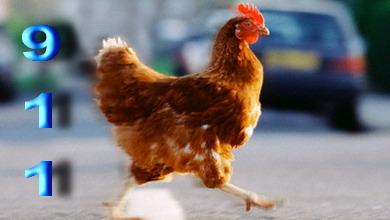OP/ED: When police finally say enough is enough
Many people think a police officer's job is responding to 911 calls with lights flashing and sirens wailing. But the truth is police work involves a lot more than 911 calls. It also involves a lot of people who aren't police officers, and spending a lot of time on tasks that none of us imagined when we were in training.
Responding to unusual calls, giving presentations to community groups, attending public events in uniform and answering questions from the public on almost any topic you can imagine are just some of the things that our team members do every day. So, with a lull in Cop Talk reader questions for this month (weather-related, I hope), I thought I would use this column to give readers an idea of some of the issues our call-takers handle that don't need lights and sirens.
Recently, a man called to report that he bought a hamster from a pet store and, much to his dismay, his new pet gave birth to a litter of 10 baby hamsters shortly after he brought it home. In addition to figuring out how to accommodate 10 more pets than expected, the man had to deal with an aggressive new hamster-mom protecting her brood. He called the store to ask for a refund and was refused. So his next call was to us, hoping for a criminal justice solution.
Our call-taker listened sympathetically, explained why police were unable to get involved in consumer disputes and, ultimately, talked the man out of his back-up plan, which was to drop the hamsters off in our parking lot. In the end the situation was resolved without further incident and without any harm coming to the hamster mom or her babies.
 Our members are used to responding to traffic safety issues. Calls about speeders, impaired, aggressive and/or distracted drivers are a regular occurrence. But every once in a while, a traffic safety call is not what it seems. For instance, some time ago, there was an incident involving a live chicken causing some chaos at a very busy intersection. The caller gave a meticulous description of the offender: muddled brown feathers, red comb, yellow beak, skinny chicken legs, and (of course) trying to cross the road. In a deadpan voice, the caller told our call-taker he had asked the flapping fowl: "Why [did you cross the road]?" – but got no response.
Our members are used to responding to traffic safety issues. Calls about speeders, impaired, aggressive and/or distracted drivers are a regular occurrence. But every once in a while, a traffic safety call is not what it seems. For instance, some time ago, there was an incident involving a live chicken causing some chaos at a very busy intersection. The caller gave a meticulous description of the offender: muddled brown feathers, red comb, yellow beak, skinny chicken legs, and (of course) trying to cross the road. In a deadpan voice, the caller told our call-taker he had asked the flapping fowl: "Why [did you cross the road]?" – but got no response.
Early one morning, one of the call-takers handled a call from a man with a bad taste in his mouth – literally. The caller had ordered a pizza the previous night but the pie wasn't up to standard and a call to the pizza parlour for a replacement was greeted with a flat-out "No." The frustrated patron decided to try to get the law on his side and called us to report the offense. Our call-taker patiently explained to the caller the difference between criminal and civil complaints and that there aren't enough police officers in the city to enforce good food. Fortunately, the explanation went down easier than the pizza. The caller ended up happy with our staff – but still cheesed off about his pizza.
Our call-takers have handled everything from reports of non-human entities on patios to Sasquatches crossing Lougheed Highway to a man who drunk-dialed 911 just to sing Merry Christmas. They handle every call like the experienced professionals they are and my colleagues and I couldn't do our jobs without them.
On a more serious note, here are some tips about calling the police:
- Use 911 only for emergencies such as crimes in progress or when people or property are being threatened. Otherwise, call our non-emergency line, 604-945-1550, which is also staffed 24 hours/day.
- Stay on the line even if you dialed by accident. Once a 911 call is received we have to follow up so if you stay on the line to tell the call-taker you made a mistake you are saving us from having to send emergency responders to check on your well-being.
- Let the call-taker lead the conversation. Every member of our call centre is trained to perform under pressure and they know exactly what questions to ask. All you have to do is speak clearly and answer every question to the best of your ability.
- Know your location. Most landlines are associated with an address and that address shows when you call 911. But cell phones don't have the same ability. So it's always best if you can give a 911 operator a cross street or landmark to help responders find you.
- Don't become annoyed if the call-taker repeats what you've just said or asks you to repeat yourself. This is necessary to verify the information.
- Don't hang up until the call-taker is finished. Emergency responders are often dispatched while you are still on the line so there's no need to rush the call.
- Interpretation services for 911 calls are available in more than 170 languages. Locally, our staff and volunteers can speak and understand almost 40 different languages. So, if you have friends or family members who don't speak English or don't speak it fluently, teach them how to say the language they speak in English (i.e., just learn to say "Korean" or "Spanish" in English and the call-taker will find an interpreter that can speak that language).


























Comments